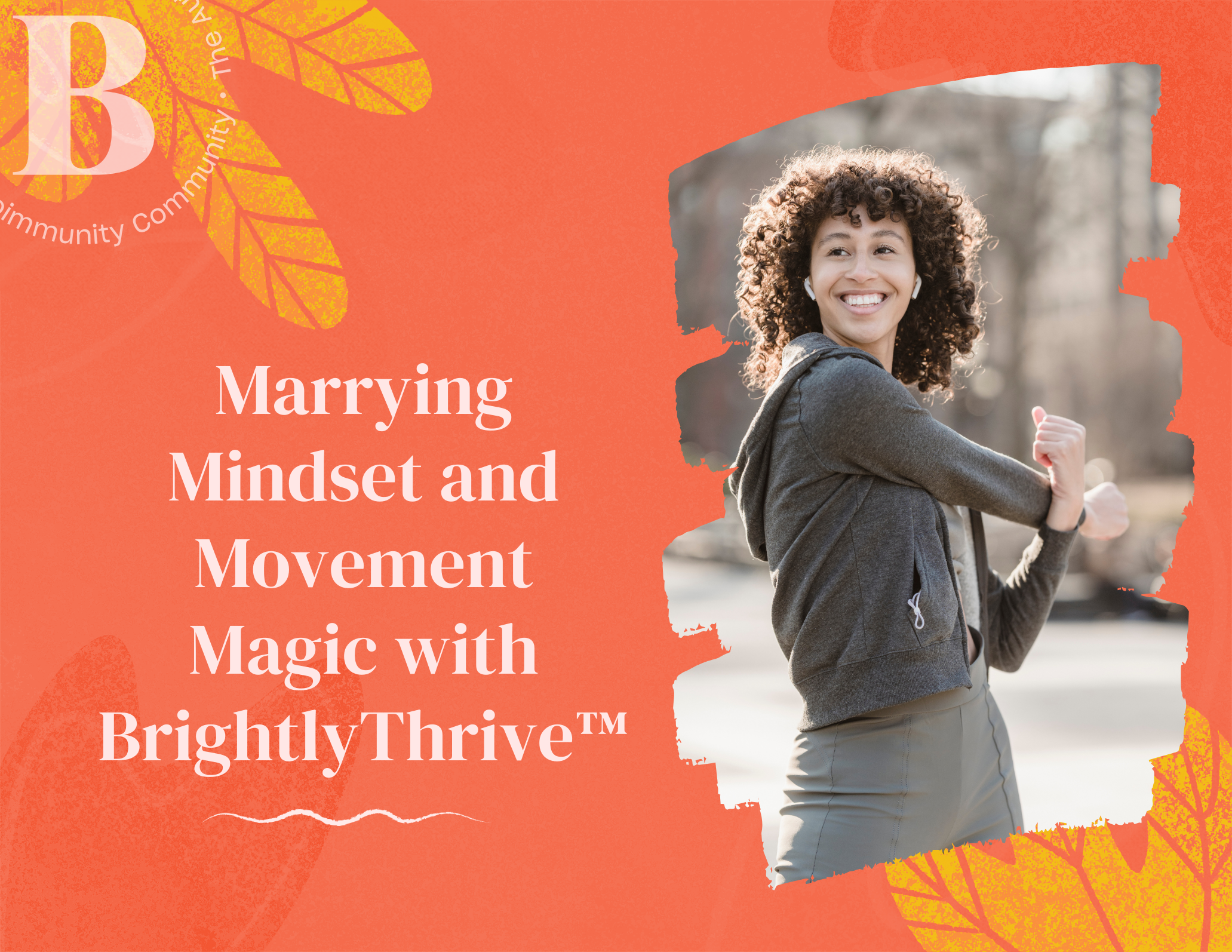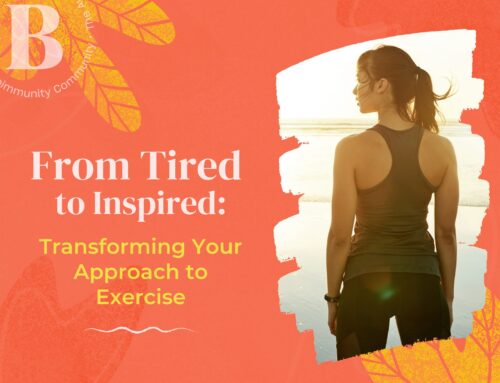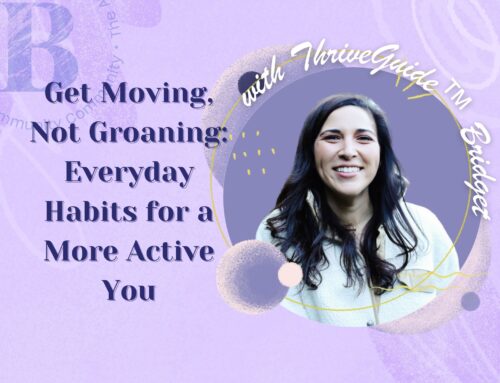
Marrying Mindset and Movement Magic with BrightlyThrive™
This month, we’re thrilled to dive into a twin-topic that’s as essential as the air we breathe—mindset and movement. With the refreshing backdrop of spring, our theme, “May in Motion,” shines a spotlight on the journey many of us face with autoimmune diseases.
So, let’s lace up our sneakers for the brighter side of the story: movement. Think of it as a compassionate friend for your body. Whether it’s through dance, yoga, or a playful stroll in the park, each step is a gentle nudge to remind your body, “We’re really doing okay.” It’s about turning those old tales of limitation into empowering narratives where every movement is a whisper of friendship to your body.
The Mind-Body Connection in Autoimmune Health
Navigating the terrain of autoimmune diseases isn’t just about dealing with physical symptoms. Oh no, it’s a full-on expedition that involves both the body and the mind. You see, when your body goes a bit rogue and starts attacking itself, it doesn’t just leave a physical mark; it can also cast a shadow on your mental health.
Stress, anxiety, and depression often walk hand-in-hand with autoimmune conditions, not just because it’s tough to deal with the symptoms, but because the inflammation associated with these diseases can directly affect your brain.
Now, here’s where the mind-body connection comes into play—a concept as intertwined as spaghetti and meatballs! This connection is a powerful reminder that what affects the body can affect the mind and vice versa. It’s like they’re two dancers in a tango, each move affecting the other’s steps. That’s why a balanced approach to managing autoimmune health is crucial. It’s not enough to just treat the body; the mind needs some tender loving care, too!
This is where our strategies need to be holistic, encompassing physical treatments and mental health support. Techniques like mindfulness, meditation, and even simple breathing exercises can help calm the mind, reducing the stress that might exacerbate physical symptoms. It’s about creating a peaceful environment where the mind can’t bully the body into believing it’s in constant danger.
Mindset and Emotional Well-being
As we journey through the theme for May, it’s apropos to acknowledge the powerful role of mindset and emotional well-being in managing autoimmune diseases. It’s not just about moving; it’s about doing these things with intention and positivity. Think of your mind as the coach and your emotions as the cheer squad—both are here to keep you motivated on the health field! Your mindset is like the ultimate pep talk before a big game, reminding you, “Yes, we can tackle this together!” Meanwhile, your emotions are decked out in pom-poms, doing backflips every time you make a healthy choice. So, let’s aim for a touchdown in well-being this May by ensuring our minds and hearts are as synchronized as a perfectly choreographed cheer routine! Why walk when you can conga line your way through challenges, right? Let’s make mental and emotional wellness a party, not a chore!
Positive Mindset: Your Secret Weapon
A positive mindset is more than just being in a good mood; it’s a strategy. When dealing with autoimmune conditions, the flare-ups and fatigue can feel like uninvited guests who decide to crash your body’s party. Here’s where a positive mindset can be a game-changer. By focusing on positivity, you’re essentially telling your body, “We’ve got this!” This doesn’t mean ignoring the pain or discomfort, but rather, choosing to focus on what you can do and celebrating the small victories. Every step, stretch, or dance move becomes a mini celebration of what your body can achieve, rather than a focus on its limitations.
Mindfulness and Meditation: Calming the Inner Storm
Incorporating mindfulness and meditation into your daily routine can dramatically improve your relationship with your body. Imagine sitting quietly, breathing deeply, and simply observing your thoughts like clouds passing in the sky. This practice can help calm the immune system’s overactive response and bring a sense of peace to your physical self. It’s like telling your body, “Hey, it’s okay to rest—we’re in a safe place.” Even a few minutes a day can reduce stress and inflammation, common culprits in autoimmune symptoms.
Reflective Exercises: Building a Friendship with Your Body
Reflective exercises are like heart-to-heart chats with your body. One effective technique is to maintain a gratitude journal focused on your body. It’s important to note that it doesn’t have to be just about anything you’re grateful for; it should be about your body, specifically. Oftentimes, living with autoimmune can keep us stuck in our heads. We become so engrossed in our symptoms and the mental noise that comes with managing chronic conditions that we forget to appreciate the body that is fighting so hard for us every day. Each day, write down three things you appreciate about your body. Maybe today, your legs carried you across the park; perhaps your arms hugged a loved one. These notes become reminders of your body’s capabilities and contributions to your joy.
Another reflective exercise is to stand in front of a mirror, look yourself in the eyes, and give compliments to your body. It might feel silly at first (we know!), like rehearsing lines for a play where you’re both the actor and the audience, but it can profoundly change how you view yourself.
Did you know that affirming yourself in front of the mirror can significantly boost your emotional well-being? Studies suggest that positive self-affirmations can enhance our overall mindset, contributing to improved health outcomes.
But here’s the thing: when we affirm ourselves in the mirror, it’s not just about boosting our ego. It’s a powerful tool for reinforcing our identity and worth, particularly valuable for those of us dealing with chronic conditions like autoimmune diseases, where self-esteem may waver due to ongoing health challenges. Think of it like driving. Sometimes, when you’re too focused on the obstacles in the road or the bad weather, you forget about the beautiful scenery along the way, or even the fact that you’re still moving forward, however slowly it may seem.
Just as you occasionally need to glance in your car’s rear-view mirror to remind yourself of the road you’ve already conquered and to safely continue your journey, looking into a mirror and affirming your worth helps navigate the emotional roadblocks and potholes of chronic illness. It’s about reminding yourself, “I am strong. I am resilient. I’ve come this far.” Each affirmation is a mile marker of progress on your personal health journey.
Combining Movement with Mindset
When you blend movement with these mindful practices, each step becomes more than just physical exercise; it transforms into a healing ritual. Whether you’re practicing yoga, taking a gentle walk, or simply stretching, approach each movement with a sense of gratitude and awareness. Celebrate your body’s movements as affirmations of its strength and your own resilience.
Practical Movement Strategies for Autoimmune Health
Guided by one of BrightlyThrive™’s expert mentors (a.k.a our ThriveGuides™)– our mindset guru, Desiree Werland, offers some practical pieces of advice to help us explore how to tailor movement to fit the unique needs of each individual, acknowledging that everyone’s body and condition are different.
Dez emphasizes the importance of understanding how our bodies respond to certain activities or movements and respecting our current state of health as we engage in any physical activity. To do this, she shares some helpful movement activities we can try to find out what works and what best supports us in our healing journey:
- Gentle Yoga: No need for headstands or pretzel poses here–unless that’s your thing. Ideal for flexibility and stress reduction, gentle yoga encourages mindfulness and a deeper connection with one’s body, fostering a nurturing rather than straining relationship with exercise.
- Light Stretching: Get ready to rock… and unroll that yoga mat! Sometimes, the simplest routines are the most beneficial. Isn’t that always the case? Light stretching can help maintain mobility and lessen stiffness without overwhelming the body.
- Short Walks: And when you’re feeling a bit unsure about where to start, Dez has a handy tip: take short, manageable walks. Think of them as your daily mini adventures. They’re just long enough to boost your mood and get the blood flowing, but not so long that you’ll need a GPS to find your way back home. It’s a simple, delightful way to keep active without turning it into a marathon effort!
Dez also stresses the importance of starting small. The idea isn’t to jump into a rigorous routine but to gradually introduce your body to more activity while being fully aware of your limits. This approach ensures that you build your strength and endurance without risking flare-ups or excessive fatigue.
With Dez’s guidance, let’s remember that every small step we take is a victory in its own right. Whether it’s a five-minute stretch, a leisurely walk around the block, or a restorative yoga pose, each movement is a celebration of what our bodies can do, not a test of their endurance. Are you ready to move at your own pace and discover the joy in gentle movement? Let’s go!
Community Support and Shared Experiences
Did you know that getting into an activity is significantly more achievable and enjoyable when you’re part of a community that shares your goals and challenges? It’s not just about doing yoga or walking; it’s about who you’re doing it with and the support you feel along the way. This is where our beautiful community at BrightlyThrive™ shines brightly, whether you’re looking to start a new fitness routine, seeking emotional backing, or just needing a cheerleader on days when motivation runs low.
At BrightlyThrive™, we leverage the power of community in bolstering not just physical health but mental and emotional well-being too. It’s well-documented that being part of a supportive community can enhance motivation, increase accountability, and make any activity more enjoyable. This is especially crucial for those managing autoimmune diseases, where every step forward is both a personal and a communal victory.
Your Autoimmune Body, Your Moves
The invitation for everyone here is clear: choose an activity that is highly specific to YOU. Your autoimmune body has unique needs and capabilities, and recognizing this allows you to engage in movement that not only respects your limits but also celebrates your strengths.
As you do, remember that each movement is a powerful affirmation of your resilience. Embrace these activities not just as exercise, but as joyful expressions of self-care that enhance both your physical and mental well-being. Your moves, your way—because when you move with intention and support, you give yourself the opportunity to hone your body’s capacity, and not simply test its limits.
References:
Serraino, C. (2023, April 11). Managing Mental Health with an Autoimmune Disease | Global Autoimmune Institute. Global Autoimmune Institute.
Gordon, S. (2024, March 31). For Those With Autoimmune Diseases, Mental Health Is Often Overlooked. Health.
P., & Relojo-Howell, D. (2022, July 4). Understanding the Connection Between Mind and Body. Psychreg.
Staff, M. (2024, February 21). How to Manage Stress with Mindfulness and Meditation. Mindful.
P., & P. (2024, February 6). Impact of Self-Esteem on Autoimmune Diseases: Mind-Body Connection. Maggie Yu MD, IFMCP – Transform Your Health.
Serraino, C. (2023, October 27). Outbursts in Autoimmunity: Disease Flare-ups | Global Autoimmune Institute. Global Autoimmune Institute.
Nortje, A. (2024, March 18). The Gratitude Journal: Prompts, PDFs, and Worksheets. PositivePsychology.com.
(2023, December 30). The Neuroscience of How Affirmations Help Your Mental Health. The Best Brain Possible.
Madeson, M. (2024, March 6). Embodiment Practices: How to Heal Through Movement. PositivePsychology.com.
Kassel, G. (2020, February 10). “Listen to Your Body” Is Fitness Gibberish — Here’s What It Actually Means. Greatist.
BSc, E. M. (2024, February 21). 45 Goal Setting Activities, Exercises & Games (+ PDF). PositivePsychology.com.
E. (2023, August 15). The Power of Meaningful Connections: Building a Supportive Community. Aaron Hall.
TAGS:
CATEGORIES:


 Dez emphasizes
Dez emphasizes 



